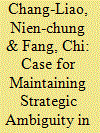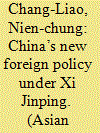| Srl | Item |
| 1 |
ID:
179178


|
|
|
|
|
| Summary/Abstract |
For decades, one key dimension of US policy toward Taiwan has been “strategic ambiguity.”1 With its equivocal reassurance in defending Taiwan, while recognizing there is “one China,” Washington has sought both to prevent Beijing from launching an unprovoked attack on the island and to dissuade Taipei from declaring the island’s de jure independence from the mainland. Since Washington established diplomatic ties with the PRC in 1979, this policy has allowed the United States to maintain cooperative and beneficial relationships with both sides of the Taiwan Strait, contributing to peace and prosperity in the region.
|
|
|
|
|
|
|
|
|
|
|
|
|
|
|
|
| 2 |
ID:
147055


|
|
|
|
|
| Summary/Abstract |
Since taking power, the new Chinese President Xi Jinping has talked of “striving for achievements,” signaling a new theme in Chinese diplomacy. This article first examines the changes in Beijing’s foreign policy structure before moving on to examine the three major schools of thought on China’s immediate relations with its neighbors, implying that the policy focus will lie with the “advance westward” school. Moreover, this article highlights how China is maximizing its influence through economic interaction, whilst noting that economics is also being used to punish hostile countries. Furthermore, it notes that China’s next step is to influence change using the multilateral frameworks of the international system, remolding global rules to China’s benefit. The article concludes by examining Beijing’s leadership role, particularly its commitment to non-alliance, and whether Beijing and Washington can rebuild a more suitable model to reflect both country’s ambitions on the world stage.
|
|
|
|
|
|
|
|
|
|
|
|
|
|
|
|
| 3 |
ID:
189934


|
|
|
|
|
| Summary/Abstract |
Will Russia’s invasion of Ukraine bring China and Russia closer together or drive them farther apart, or will it be business as usual? This article addresses this question by conceptualizing the main characteristics of the China–Russia strategic partnership. It argues that a strategic partnership, characterized as it is by informality, equality, and inclusivity, is essentially different from an alliance or alignment. These characteristics allow Beijing to distance itself from Moscow’s invasion of Ukraine. This makes it unlikely that China will attempt any simultaneous aggression in East Asia or that it will be able to mediate in the conflict. This effectively rules out the rise of a China–Russia axis. As China strives to balance its close ties with Russia and its economic engagement with the West, Beijing is more likely to maintain, rather than strengthen or weaken, its strategic partnership with Moscow.
|
|
|
|
|
|
|
|
|
|
|
|
|
|
|
|
| 4 |
ID:
183265


|
|
|
|
|
| Summary/Abstract |
This article explores why Chinese diplomats have become so aggressive, discarding the professionalism and courtesy that have facilitated China's engagement with the world for more than four decades. Some argue that Chinese diplomats want to distract foreign audiences from Beijing's handling of the COVID-19 pandemic. Others suggest that they are trying to demonstrate their strength abroad in response to popular nationalism at home. Still others argue that their bluster is intended to show their loyalty to President and Chinese Communist Party General Secretary Xi Jinping. All of these explanations appear to be valid to some extent.
|
|
|
|
|
|
|
|
|
|
|
|
|
|
|
|